A sharp focus on Iraq may make sense in theory, in as much as resources of anti-war organizers are indeed limited. In practice, however, Washington will not let us focus on Iraq alone, and the recent development in Lebanon, as well as the rest of the Middle East (such as the election of Mahmoud Abbas, the candidate supported by Israel and the United States), is the case in point. Whether anti-war organizers wishing to unite all who can be united in opposition to the Iraq War like it or not, Israel is the anchor of Washington's Middle East policy. Nicholas Blanford's essay "Hizballah in the Firing Line" was prophetic: "The overthrow of Saddam Hussein's regime in Iraq and Washington's recent pressure on Syria have placed Lebanon's Hizballah organization firmly in the firing line in the next phase of George W. Bush's war on terrorism. . . . Hizballah potentially faces the greatest challenge of its 18-year history, with the US viewing the organization as a possible threat to its position in Iraq, a continuing menace to its ally Israel and an impediment to the successful implementation of a peace agreement between Israel and the Palestinians" (emphasis added, Blanford, Middle East Report Online, April 28, 2003). Washington's perception of Hezbollah that Blanford succinctly sums up above is exactly what has fueled its policy toward Syria and Lebanon: the Syria Accountability and Lebanese Sovereignty Restoration Act of 2003 (which the Senate voted for 89-4 -- notice that there was only one Democrat among four No votes: Chafee [R-RI], Enzi [R-WY], Jeffords [I-VT], and Byrd [D-WV]); the United Nations Security Council Resolution 1559 (September 2, 2004); and support for the so-called "Cedar Revolution" (cf. Kurt Nimmo, "Lebanon’s Franchised Cedar Revolution," Another Day in the Empire, March 1, 2005), the pro-Zionist rationale of which is clearly expressed by Hillary Rodham Clinton's statement and letter to George W. Bush ("Senator Clinton Condemns Syrian Support for Terrorism: Urges Tighter Sanctions," March 2, 2005).
If Washington had gotten its wish regarding Syria and Lebanon, that would have certainly strengthened its hands in its continuing occupation of Iraq as well as support for the Israeli occupation. Unlike in Serbia, Georgia, and Ukraine, however, Hezbollah managed to sabotage Washington's interference in Lebanon spectacularly:
At least 500,000 people demonstrated against Western interference in Lebanon and denounced United Nations Security Council Resolution 1559, which calls for all foreign forces to leave Lebanon and for armed militias to be dismantled. The United States and France introduced 1559 last year; the council passed it in September.Brian Whitaker of The Guardian gives a similar estimate -- "Trying to estimate the number was futile, but half a million would be plausible and a million not unbelievable" -- and adds an important observation on the class content of the demonstration: "The anti-Syrian protesters who have attracted worldwide attention are mostly Christians, plus Sunni Muslims and Druze, and they are generally from the better-off sections of Lebanese society. Yesterday's masses were overwhelmingly the poorer -- and historically downtrodden -- Shia, who form 40% of the population" ("500,000 Mass for Hizbullah in Beirut," March 9, 2005).
The crowd that packed central Beirut dwarfed earlier rallies against Syria. . . .
. . . [T]he huge pro-Syria demonstration sent a message to the Lebanese opposition and the international community that Hezbollah remains a powerful political force. "The majority of Shiites are behind Hezbollah, and if we want to talk about democracy and people power, we are witnessing this," said Amal Saad-Ghorayeb, a professor of politics at Lebanese American University. "Is the U.S. going to turn around and say, ... 'That's the kind of democracy we are not interested in?'" (emphasis added, Nicholas Blanford/The Christian Science Monitor, "Supporters of Syria Rally 500,000 Strong in Beirut," USA Today, March 8, 2005)
Photographs bear witness to the crowd estimate given by Blanford and Whitaker, and the message of the demonstration is unmistakable:
Ignoring Hezbollah's demonstration in which 13-26% of the 3.8 million Lebanese population participated, however, both Democrats and Republicans are united in support of the twin occupations and policies toward Lebanon and Syria that go with them:
A general view of hundreds of thousands of protesters taking part in a demonstration organized by pro-Damascus movements led by the Shiite Muslim Hezbollah group in downtown Beirut.(Anwar Amro/AFP)
Lebanese people wave flags as they gather for a pro-Syrian rally in central Beirut March 8, 2005. Hundreds of thousands of flag-waving Lebanese flooded central Beirut for a pro-Syrian rally called by Hizbollah that dwarfed previous protests demanding that Syrian troops quit Lebanon. (Mohamed Azakir/Reuters)
Protestors hold a poster against U.S. President George W. Bush and wave Lebanese flags in a central Beirut square, Lebanon, Tuesday March 8, 2005. Nearly 200,000 pro-Syrian protesters gathered, chanting anti-American slogans and wildly waving Lebanon's flag in answer to a nationwide call by the militant Shiite Muslim Hezbollah group to demonstrate against foreign intervention and counter weeks of massive anti-Syrian rallies. Arabic text reads the same as the english.(Mahmoud Tawil/AP)
A banner against the United States, France and UN Security Council resolution 1559 which calls for Syria to remove its troops from Lebanon is seen during a pro-Damascus demonstration led by the Shiite Muslim group Hezbollah in Beirut.(AFP/Ramzi Haidar)
A protestor holds a portrait of Syrian President Bashar Assad as others wave Lebanese flags in a central Beirut square, Lebanon, Tuesday March 8, 2005. Hundred of thousands pro-Syrian protesters gathered, chanting anti-American slogans and waving Lebanon's flag in answer to a nationwide call by the militant Shiite Muslim Hezbollah group to demonstrate against foreign intervention and counter weeks of massive anti-Syrian rallies. (AP Photo)
Lebanese people wave flags during a pro-Syrian rally in central Beirut March 8, 2005. Hundreds of thousands of flag-waving Lebanese flooded central Beirut for a pro-Syrian rally called by Hizbollah. (Damir Sagolj/Reuters)
Lebanese protesters wave flags and banners during a pro-Syrian rally in central Beirut March 8, 2005. Hundreds of thousands of flag-waving Lebanese flooded central Beirut for a pro-Syrian rally called by Hizbollah that dwarfed previous protests demanding that Syrian troops quit Lebanon. (Damir Sagolj/Reuters)
His [George W. Bush's] two predecessors in the Oval Office, his father [George Herbert Walker Bush] and Bill Clinton, both spoke of the latest signs of progress in an appearance at the White House. The first President Bush was restrained, pronouncing himself "very pleased," but cautioning that much work remained to be done.An anti-war movement worth its name in the United States cannot avoid confronting this bipartisan support for the twin occupations head on.
Mr. Clinton was more ebullient, noting that the Iraqi elections "went better than anyone could have imagined." In Lebanon, he said, "the Syrians are going to have to get out of there and give the Lebanese their country back, and I think the fact that the Lebanese are in the street demanding it is wonderful."
Asked about huge demonstrations on Tuesday, sponsored by Hezbollah, that demanded just the opposite, Mr. Clinton said: "I find it inconceivable that most Lebanese wouldn't like it if they had their country back. You know, they want their country back and they ought to get it." (Todd S. Purdum, "For Bush, No Boasts, but a Taste of Vindication," New York Times, March 9. 2004)
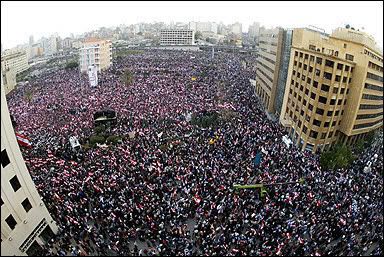
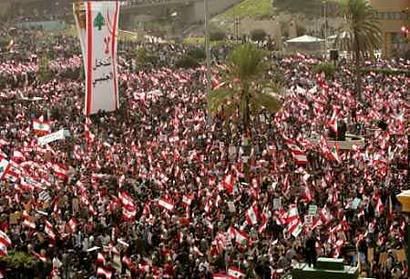
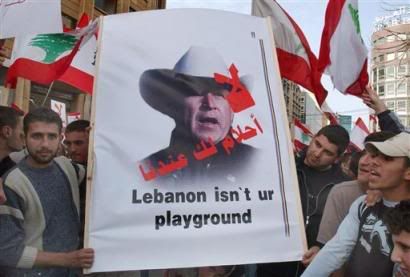
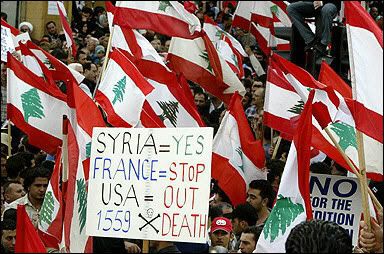


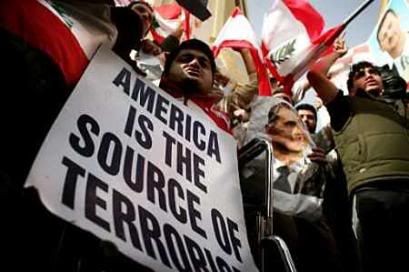




No comments:
Post a Comment